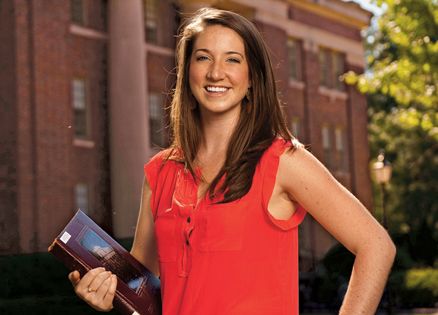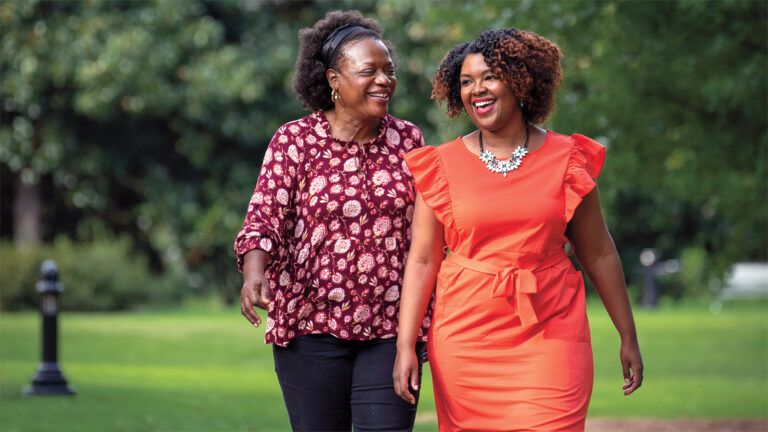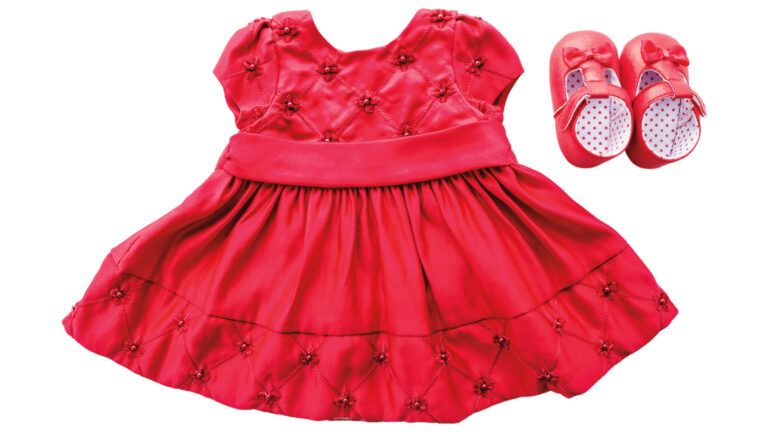There’s a reason why I’m the one to tell this tale, but that will come later. The story starts with a Christmas letter.
It was one of Deborah Breda’s most cherished holiday traditions. She loved sharing with family and friends, telling everyone how the kids were doing in school, how they were adjusting to the New Jersey winters, her husband John’s career at the bank, her work as a teacher, their Bible study at church.
Even more, she looked forward to the letters that came in return, savoring the smallest tidbit of news, a niece’s violin solo or a new pet. She felt a connection, a sense of belonging she’d craved all her life. But the one letter she looked forward to most had never arrived.
For 11 years she’d faithfully mailed her family’s news to Winston- Salem, North Carolina, to a doctor she’d met only once when she was a girl and had her picture taken with him. The one person she knew who might be able to answer her questions about her father.
She was a 40-year-old woman, with a family of her own, but there was an emptiness in her life.
Now once again at her kitchen table she addressed an envelope to Dr. Reid Bahnson. Her pen hesitated at the bottom of the letter. What could she say that she hadn’t said before?
“I hope you have a merry Christmas,” Deborah finally wrote. “You’re always in my thoughts and prayers. Would love to hear from you sometime.” She folded the letter and put it in the envelope. It seemed such a futile gesture. But if she gave up hope what would she have left?
Growing up in her maternal grandparents’ home in tiny Nederland, Texas, an hour from the Gulf of Mexico, she’d often questioned her mother, Joyce, for details about her father.
How had they met? Was he handsome? What was he like? Why had he left them? And where was he now? Why did he never write or call? An endless stream of queries bubbled up inside of her.
Her mother answered her questions, sparingly. Deborah pieced everything together the best she could, like an enormous jigsaw puzzle whose pieces never seemed to quite fit.
Joyce Guthrie had met Alec Bahnson in 1960 at a Christian school run by an evangelist in Arizona where they were both teachers. He was incredibly handsome, strong and athletic, intense and charismatic, nearly 10 years older than she.
He’d fought in World War II with the legendary 10th Mountain Division, an alpine unit that suffered terrible casualties.
They had a whirlwind romance, marrying only six months after they met, not even telling their families until afterward. They left the school and traveled across the country, finally arriving in Winston-Salem, North Carolina, where the Bahnsons had settled in the early 1860s.
There her husband no longer seemed like the same man she’d fallen in love with. He was moody, prone to strange, obsessive behavior and angry outbursts. It only got worse after she told him she was pregnant. Months later he left her.
“I came back to Granddad and Grandma’s, and that’s when you were born,” her mom told Deborah. “They helped me heal from the divorce so you could be brought up in a healthy environment and we could continue on with our lives. We’re both so very, very blessed.”
Deborah loved living with her grandparents. There was always someone to read her a story or take her to the park. Joyce, a schoolteacher, had summers off. But it wasn’t enough to fill the void inside of her.
“What happened to Daddy?” Deborah would invariably ask.
It was an era when no one spoke of mental illness or what they called shell shock back then. “The war affected him,” her mom said. “And I think the responsibility of being a husband and then me being pregnant was just too much. Still, I know he loves you.”
Her mother never once said a cross word about Alec Bahnson. In fact, she went out of her way to talk up the Bahnsons. They were doctors, inventors, business people, prominent in Winston- Salem. But the question lingered, why didn’t they ever get in touch?
Then when she was 12, her mother announced that they were going on a vacation, a cross-country trip to New York City. Along the way they’d stop wherever they liked. A week later they pulled off Interstate 40, deep in North Carolina. Winston-Salem, the exit sign read.
They drove by the Bahnson family homestead, an impressive Tudor house. Deborah looked on, her eyes as wide as saucers. A few blocks away her mother stopped outside a beautiful stone building.
“This is the office of one of your father’s brothers, Dr. Reid Bahnson,” her mother said. “C’mon, let’s say hi.”
Joyce introduced herself to the receptionist. Minutes later a tall, distinguished man in a white coat appeared, his expression puzzled. Deborah realized her mother hadn’t even told him they were coming.
“Dr. Bahnson,” Joyce said, “I’d like you to meet my daughter, Debbie…your niece.”
“Well, uh, it’s nice, I mean, welcome,” he said. “What brings you to Winston-Salem?”
They talked for only a few minutes. Dr. Bahnson posed for a picture with Deborah outside the office. And that was it. No hugs. No promises to keep in touch. What her mother hoped for, Deborah didn’t know.
But the name and the memory never left Deborah. Somehow this polite but reticent man seemed like the key that could unlock this hidden side to her family. But how?
She sometimes held the snapshot of herself and the doctor in her hands, as she did now before sending yet another Christmas letter to him in Winston-Salem, praying for an answer. It was 2001. Her son was 12 years old, her daughter, 10, old enough to have questions of their own about their ancestry.
Then one evening the phone rang. “Is this Deborah Breda?” a voice on the other end asked, a voice she couldn’t place.
“Yes,” Deborah said.
“My name is Fred Bahnson,” the caller said. “I’m sorry to be the one to tell you, but your father, Alec, has passed away. I’m the executor of his will and, well, I thought you should know.”
Questions whirled in her mind amid a sea of emotions. “How did you find me?” Deborah finally asked.
“I asked my uncle, Dr. Reid, if he knew how to reach your mother,” Fred said. “He had a box full of Christmas letters from you. We’re having a memorial service. Would you be able to come?”
In a church in North Carolina she listened intently to the words spoken of her father, a man it seemed no one could fully explain. He’d bravely served his country and devoted much of his life to missionary work.
But all agreed, after the war he wasn’t the same, his mind troubled, easily stressed, haunted, it seemed, prone to nervous breakdowns. She learned he’d been hospitalized for a time in the early 1950s.“I know your father loved you,” many people told her. “It’s just a shame he was so troubled.”
Yet at long last she had a family: cousins, aunts, uncles, people who wanted to keep in touch, to send Christmas letters, who invited her into their lives. She felt embraced and cared for, that emptiness in her finally filled.
She never got a full explanation of why they had kept her and her mom at arm’s length, but she sensed pretty clearly that they were protecting her from her father’s unstable behavior.
Suddenly that lifelong jigsaw puzzle felt nearly complete, as if God was putting in the final pieces, answering a lifetime of prayer. Through a Christmas letter.
A few months later she was going through some of her deceased grandmother’s effects. And there in a box filled with old photos and letters she found an envelope addressed to her. Sent airmail from Israel. It was from her father, written on one of his missionary travels.
“I planted two trees here to honor your mother and you. You’re always in my thoughts and I love you very much.” Deborah’s mother was as shocked as she was. No doubt her grandmother had hidden the letters to protect Joyce and Deborah.
Deborah would never fully understand her past and her father’s pain or the desire of people to protect children, even from the truth. Yet now she would be able to explain the past to her own children.
By now, you might have guessed, the reason I’m telling this story is because I’m Deborah’s daughter. The story, you see, doesn’t end there.
Inspired by my mother reconnecting with her Tar Heel heritage, I set my sights on going to North Carolina for college. I was Chapel Hill bound, drawn by its history, size and prestige.
Then my guidance counselor suggested I look at another North Carolina school, tiny Davidson College. I’d never heard of it. Not interested, I told her. No way. But she kept pushing. Finally, I agreed to visit the campus.
There in the student union I saw a familiar name on a plaque honoring alumni: Bahnson. A trip to the library uncovered a weathered 1946 annual and a picture of my grandfather Alec Bahnson. A Davidson alum. Just like his brothers, Henry and Reid, before him.
A cousin, I discovered later, had just graduated himself. I felt an incredible sense of connection, of belonging. As if I were that final piece of our family’s puzzle. I was right where I was meant to be.
Download your FREE ebook, True Inspirational Stories: 9 Real Life Stories of Hope & Faith




